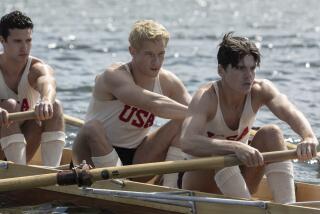THE ROW TO THE OLYMPICS : Women Rowers Battle for Berths on Charles River
- Share via
CAMBRIDGE, Mass. — The faces of the rowers looked as cold and wind-stung as early morning on the Charles River.
Oars ripped into the tea-colored Charles to the cadence of the coxswains. The tension was acute. Six women were trying out for the four remaining port-side rowing seats available for a race in Seattle, one of the last major events before the Summer Olympic trials in June.
“Now switch seat three,” ordered Coach Holly Hatton over a megaphone.
Hatton maneuvered her motorboat around the two racing shells, watching to see how the shift affected their speed. She took a few notes on a dog-eared pad, but she instantly detected the stronger rower.
Hatton would arrange six five-minute races before deciding on the Seattle team.
“The anxiety level is tremendous these days,” Hatton said. “The Olympics has everyone on edge. Now, everything is on the line all the time. It’s tough mentally as well as physically.”
For more than a year, the lives of about a dozen elite female rowers have centered on the weathered Boston Rowing Club boathouse down the street from Harvard Yard. For some, the old building will be a gateway to Seoul, South Korea.
“It’s come down to this, and everyone is looking for the little edge, that little extra, to put them on the team,” said Hatton, a coxswain on the 1980 team pulled from the Olympics by the U.S. boycott protesting the Soviet intervention in Afghanistan.
Except for an unlikely surge by a college team in upcoming races, the Olympic women’s team will come from the BRC and Seattle’s Pocock Center. A series of lesser races culminates with the June 22-26 nationals in Indianapolis, the most important event in selecting the members of the four-and eight-member shells and the single scullers.
Slowly, outside lives have dissolved for the rowers, who came from around the country to the BRC last year. Jobs, such as carpenter and physical therapist, have been abandoned as the training intensified.
“There’s a feeling that time is running out,” said Stephanie Maxwell, 24, who came to train at the BRC after graduation from Cornell University and rowed with the eight-member team that placed second behind Romania in last year’s world championships in Denmark. “There are so many peaks you go through, you just try to stay on top as the Olympics near.”
For 31-year-old Abby Peck, the 1988 games may mean a last chance for an Olympic medal she missed by two-tenths of a second four years ago in Los Angeles.
“I try to keep my mind off the Olympics,” said Peck, a member of five national teams since beginning to row competitively six years ago. “The emotional tension would be just too exhausting.”
More to Read
Go beyond the scoreboard
Get the latest on L.A.'s teams in the daily Sports Report newsletter.
You may occasionally receive promotional content from the Los Angeles Times.






